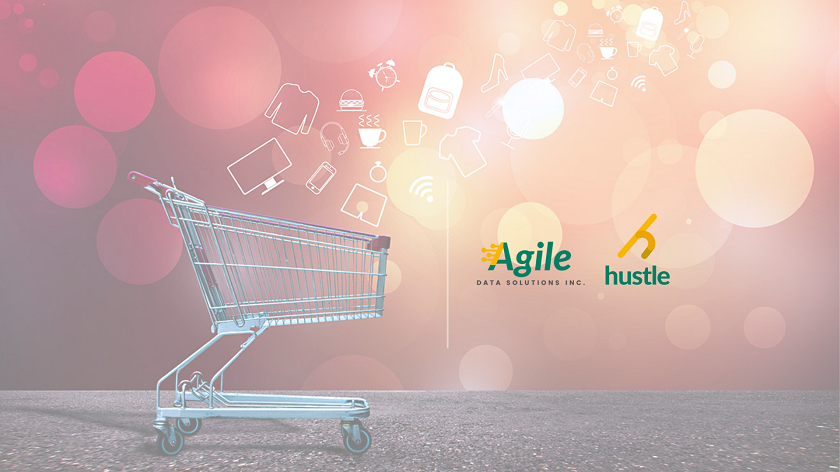
In an era dominated by digital shopping carts, Filipino shoppers are rediscovering the appeal of brick-and-mortar retail stores. However, even as in-store shopping regains popularity, the digital shopping habits formed during the pandemic continue to influence consumer behavior, driven by factors like price, discounts, and convenience.
Agile Data Solutions Inc., a technology-enabled market research firm, has conducted a comprehensive nationwide study using its Hustle PH mobile app. The study’s objective is to offer valuable insights into enduring consumer behavior trends among Filipinos and provide a glimpse into the future of shopping habits.

Online Shopping Habits
Price comparison is a top priority for Filipino shoppers when it comes to online shopping. Digital platforms serve as virtual price catalogs, allowing consumers to canvass and compare deals from various stores. This convenience of browsing multiple retailers without geographical limitations or dealing with traffic congestion has become especially valuable for price-sensitive consumers.
According to a recent study conducted by Agile Data Solutions Inc., 92% of surveyed adults reported saving money by purchasing essential items online. Popular online shopping platforms like Shopee and Lazada were preferred by Filipinos, with 76% of respondents taking advantage of sales, vouchers, and 34% utilizing free shipping promotions to maximize their savings.
The study also revealed that many consumers engage in bulk buying of familiar fast-moving consumer goods (FMCGs) and commodities such as diapers, tissue rolls, and household essentials. These well-known products garner significant attention online and drive higher basket purchases, particularly when combined with attractive bulk deals. Among the respondents, 50% practiced bulk buying, with 28% motivated by attractive discount prices and 26% emphasizing the need to stock up on essential items. Additionally, 16% highlighted the time-saving convenience of fewer trips to physical stores as a key advantage.
This trend raises questions about the potential shift in brick-and-mortar stores towards smaller purchases of FMCGs and commodities as consumers increasingly turn to online platforms for bulk buying, driven by the desire for savings and convenience.
The surge in online shopping platforms and the phenomenon of “revenge spending” following prolonged lockdowns have also contributed to impulse buying among 45% of shoppers. While 83% compare prices across different online platforms before making impulsive purchases, 91% plan and set a budget for their online shopping, and 89% have savings goals they aim to achieve before making purchases.
Despite the growing appeal of online shopping, 28% of Filipino shoppers expressed concerns about the authenticity and quality of products they receive. As a result, consumers rely heavily on product reviews to guide their purchasing decisions, seeking reassurance before making a commitment. Other significant concerns include the safety of packaging (17%) and delivery time (15%), indicating the importance of addressing these issues to enhance the overall online shopping experience.
Moreover, 71% of surveyed shoppers prefer cash on delivery (COD) as their primary payment method, not due to a lack of familiarity with technology integrations but rather due to a lack of trust in the product delivery process. The disparity between COD users and those opting for payment centers/e-wallets (14%) or in-app wallets like ShopeePay (6.5%) and Lazada Wallet (6%) underscores the significance of building consumer trust in the online shopping journey.
Data also indicates differences in average spending among these payment preference groups. Users who prefer COD typically spend between 200-500 pesos, while those who prefer Lazada Wallet spend less than 500 pesos. In contrast, users who opt for alternative payment methods, particularly ShopeePay, have an average spending amount above 500 pesos. This suggests that customers using alternative payment options may have more confidence in the purchasing process and are willing to spend more as long as trust is cultivated.
In-person Shopping Habits
In a surprising turn of events, the study has revealed that despite the popularity of online shopping for familiar commodities, 77% of consumers still prefer a hands-on approach when it comes to discovering and evaluating unknown products. This suggests that the sensory appeal and immersive experience of in-store shopping continue to hold their own against the convenience of online shopping. As a result, brick-and-mortar stores may increasingly serve as venues for product launches and trials, emphasizing the importance of physical retail spaces.
Interestingly, the data shows that 33% of respondents view online shopping as an alternative to in-store purchases rather than a complete replacement. This sentiment is supported by the fact that 45% of participants reported making a purchase in a physical store within the past week, while 54% had ordered something online during the same timeframe. These close percentages indicate a strong inclination among consumers to maintain a balance between in-store and online shopping experiences.
The study further highlights several key factors contributing to the enduring appeal of traditional in-store shopping. For 32% of respondents, the instant gratification of receiving goods upon purchase gives brick-and-mortar stores an edge, even when considering the time and effort required to visit a physical location. Additionally, almost half of the participants (49%) appreciate the sense of certainty and accessibility that comes with knowing they have a physical store to visit in case of product malfunctions or defects. Lastly, 41% believe that on-site purchases outshine online shopping in terms of after-sale services, indicating a preference for face-to-face interactions typically associated with brick-and-mortar stores.
“It is not a battle between online vs. brick-and-mortar stores. On the contrary, our market data shows that these two channels are evolving into a symbiotic relationship,” explains Jason Gaguan, the founder of Agile Data Solutions Inc. “The lockdowns during the pandemic have indeed accelerated the e-commerce revolution, but as we transition to a more open ‘new normal,’ we see consumers becoming omnichannel shoppers. They enjoy the ease of deal hunting in e-commerce while also valuing the rewarding experience and efficiency of physical shopping.”
Gaguan further notes the evolving product mix between channels, with familiar commodities and popular products being sought online for deals, while higher-priced items are researched online but ultimately purchased in physical stores. E-commerce channels serve as online catalogs for brick-and-mortar stores, showcasing their higher-priced products. This evolving symbiosis is a market movement that Agile Data Solutions Inc. continues to track with anticipation.
The market study conducted by Agile Data Solutions Inc. provides physical and online retailers with an in-depth understanding of the primary and secondary drivers of consumer behavior today. It offers a comprehensive outlook on the current market situation and future projections. Through their Hustle PH app, the company utilizes the power of crowdsourcing data, democratizing market intelligence and providing a reliable stream of insights that cater to businesses of all sizes, from Fortune 500 giants to MSMEs and start-ups.
“Agile Data Solutions Inc. is the ideal business intelligence solution for companies across various industries seeking insights into customer behavior and market trends,” Gaguan adds. “What sets our Hustle PH platform apart is our approach to rewarding respondents, ensuring the collection of reliable data. This allows us to offer businesses a comprehensive view of customer preferences and market patterns, empowering them to make well-informed decisions.”





